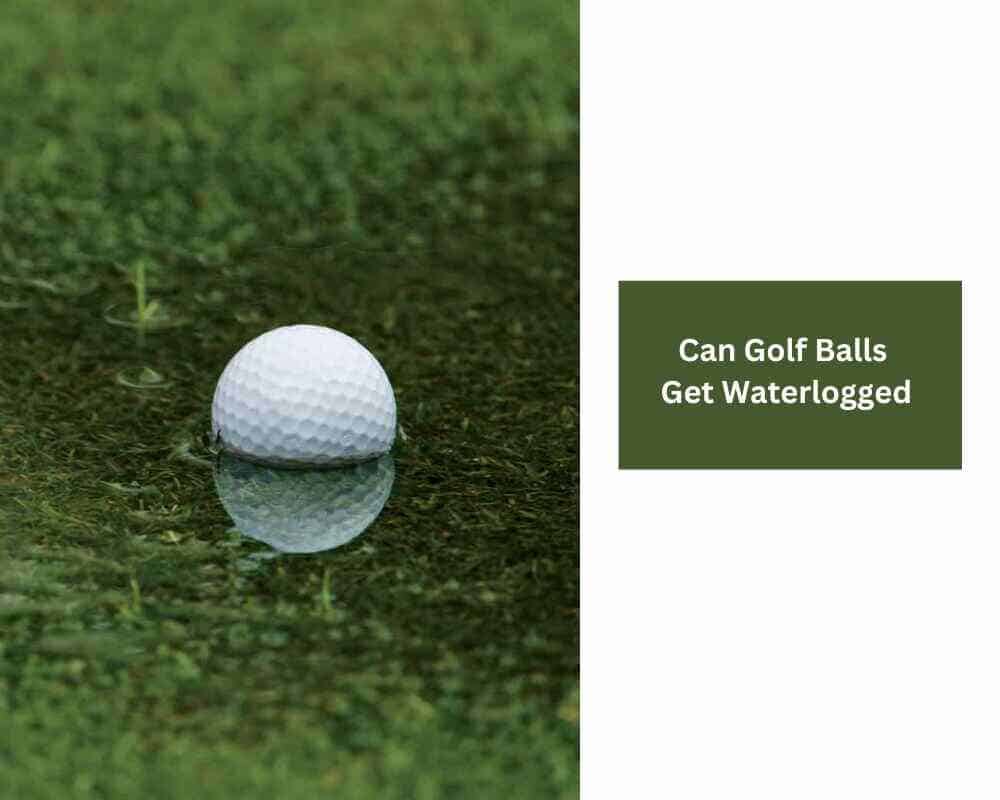When you are golfing, the golf ball can fly into the water anytime if you are not careful. As good golf balls cost quite a lot, reusing the old one can save you from the trouble of buying a new one. So, can golf balls get waterlogged?
Yes, golf balls get waterlogged. Due to the construction, the water can get through the small pores of the golf ball. Even if the ball is not underwater for more than an hour, it can still get waterlogged and unusable further.
Therefore, knowing how to prevent this from happening is essential. Let’s go and learn more about it!
Can Golf Balls Get Waterlogged?

Yes, your golf balls can get waterlogged easily. Even if your golf ball is underwater for a short period like 6-12 short hours, water can get inside through the pores. As a result, the water exposure will make your ball unusable anymore.
Good golf balls usually sink once they fall into the water. You will also find some golf balls are floating when fall in the water. In both the cases water damage can make your golf ball not fly like before. The cover absorbs all the water and makes it hard to use.
Moreover, it becomes heavier while providing less accuracy. So even if you manage to get the ball out of the water, it won’t be of any use if it has been there for more than an hour.
How Do I Know If My Golf Ball Is Waterlogged?
There are a few signs that will let you know whether your phone is waterlogged or not. Some of the major ones are:
- Increased Weight: When your golf ball is waterlogged, it will feel heavier than a dry one. So, comparing the weights with another ball will help you to know that.
- Appearance: Waterlogged golf balls may lose their color and look darker than regular. They will also feel damp due to water absorption. Besides, you will see a difference in the flying if you throw that in the air.
- Performance: A waterlogged golf ball doesn’t perform as well as a regular golf ball. The ball will fly a shorter distance and won’t give you the accuracy in the shorts. If you notice a marked distinction in your shots, it can be an indication that your ball is waterlogged.
- Squeeze Test: try squeezing your golf ball gently using your hands. If you feel that it’s not as hard as it was before, or if it feels soft, it may be waterlogged.
- Drop Test: Usually, if you drop your golf ball from a good height, it will make a crisp click. But when it’s waterlogged, it will make a dull thud instead of a brittle click.
Why Can’t We Use Waterlogged Golf Balls?
Waterlogged golf balls can negatively impact your golfing. Experts suggest not using them in your golfing due to several reasons. One of the main reasons is that these balls cannot travel fast like dry golf balls.
Due to the added weight of water, they lose their aerodynamics. As a result, it reduces the ball’s flying distance while making it challenging for the golfer to ensure accuracy.
These balls also lose their spinning capacity due to their weight. You will fail to control the flight while missing the target.
Moreover, if a golfer uses waterlogged balls, it becomes troublesome to avoid the hazards. And these balls don’t last as long as real golf balls. They are more prone to damage and wear out faster.
Should You Use A Waterlogged Golf Ball?
No, you shouldn’t use a waterlogged golf ball as it can impact your performance. You will fail to maintain accuracy, and control which may reduce your score.
Besides, the added weight affects the ball’s spinning so even if you give your best efforts, you won’t get the right outcome.
Not only that but using a waterlogged will also damage your clubhead by putting more stress on it.
You will damage the club head and reduce its longevity as well. However, you can use the golf ball if you are practicing, or hitting into a net or other non-course areas.
Frequently Asked Questions (FAQs)
How do you fix waterlogged balls?
You cannot fix a waterlogged golf ball. Many people suggest putting it in the microwave but that won’t do any good. Instead, it will make the ball more damaged. It can also create a safety hazard.
What happens when a golf ball is waterlogged?
When your golf ball is waterlogged, it will be permanently damaged. You won’t be able to use it due to the extra weight and damage.
Moreover, even if you can’t notice the damage from the outside, your performance will be seriously affected by the ball’s waterlogging.
Are lake golf balls OK to use?
You can’t use your golf ball if it has fallen into the water for a long time. However, you may be able to use it if the duration is under an hour. When the ball is underwater for more than an hour, water gets through it making it unusable.
Do wet golf balls make a difference?
Wet golf balls don’t give the same performance as regular golf balls. They will spin less and impact your golfing. Moreover, they fail to fly properly due to the extra weight of the water.
Conclusion
Now as you know: can golf balls get waterlogged, it’s better not to use wet or waterlogged golf balls if you want to ensure the perfect performance. Waterlogged golf balls will hinder your performance even if you make the swings right.
So, instead of wasting your energy, get yourself a new ball when your golf ball has been waterlogged.
